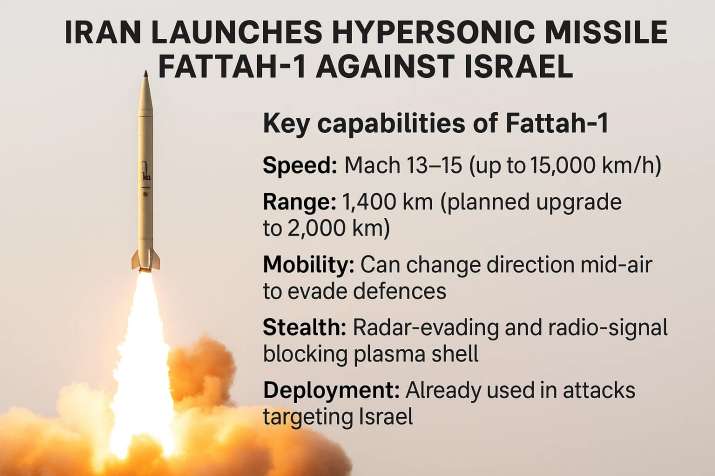Fattah Hypersonic Missile

- 21 Jun 2025
In News:
In light of intensifying hostilities between Iran and Israel, Iran has deployed its advanced Fattah hypersonic ballistic missile, marking a significant shift in regional military capabilities and raising concerns over existing air defence systems such as Israel’s Iron Dome.
About Fattah Hypersonic Missile
- Developed by: Aerospace Force of the Islamic Revolutionary Guard Corps (IRGC), Iran
- Unveiled: November 2022 (on the 11th death anniversary of missile scientist Hassan Tehrani Moghaddam)
- Inducted: 2023
- Name Meaning: “Fattah” translates to “victor” or “conqueror”
Key Capabilities:
Feature Specification
Speed Mach 13–15 (approx. 15,000 km/h)
Range 1,400 km (planned upgrade to 2,000 km)
Mobility Capable of mid-air directional changes
Stealth Forms a plasma shield that blinds radar & blocks radio signals
Deployment Used in attacks against Israeli territory
- A more advanced version, Fattah-2, with a range of 1,500 km, is reportedly under development.
Strategic Significance
- The missile’s ability to evade modern air defence systems—such as Iron Dome and David’s Sling—makes it a potential game-changer.
- Iran claims Fattah is capable of operating within the upper atmosphere with unpredictable trajectory, making interception extremely difficult.
- This hypersonic manoeuvrability marks a leap over traditional ballistic missiles that follow a predictable parabolic trajectory.
Comparative Global Context
Iran claims to be the fourth country globally to possess operational hypersonic missiles, after:
- Russia
- China
- India
Other nations like the USA and North Korea are developing or testing hypersonic systems but have not fielded them in combat as Iran reportedly has.
Operational History
- October 2024: Fattah missiles were reportedly used by Iran in a prior attack on Israeli targets.
- 2025 Escalation: The missile was deployed during “Operation Honest Promise 3,” marking the 11th wave of retaliatory attacks by Iran on Israeli territory.
Iran’s Broader Ballistic Missile Arsenal
In addition to Fattah, Iran possesses a wide range of short-to-long range missiles, including:
- Fateh Series: Short-range solid-fuel missiles (Fateh-110, Fateh-313)
- Zolfaghar and Qasem: Extended versions of Fateh series
- Emad: Long-range liquid-fuel missile with 1,700 km range
- Sejjil: Solid-fuel missile with 2,500 km range, speeds up to 17,000 km/h
- Others: Kheibar, Ghadr-110, Fajr-3, Shahab-3, Ashoura, Haj Qasem, Basir
Implications for India and the Region
- Regional Arms Race: Iran’s hypersonic capability may trigger further military build-up in the Middle East.
- India’s Position: As one of the few nations with hypersonic R&D, India must monitor evolving doctrines and maintain strategic balance.
- Global Security: The usage of such missiles in conflict zones raises concerns over escalation, proliferation, and undermining of existing missile defence systems.
